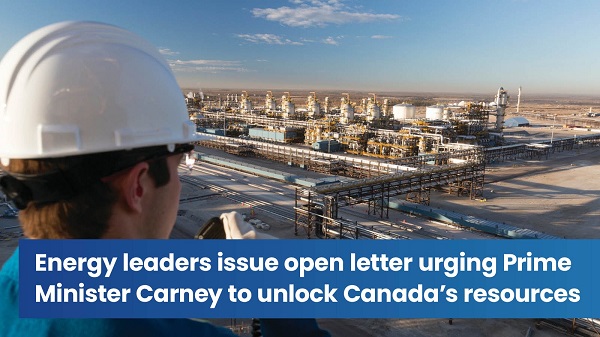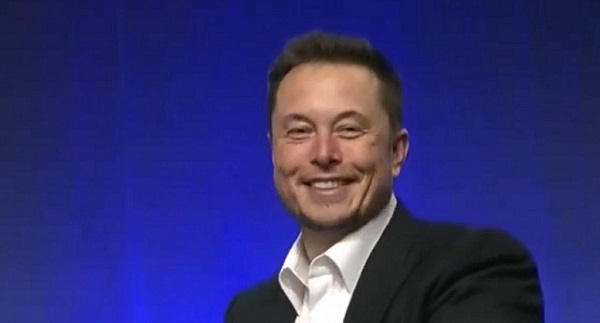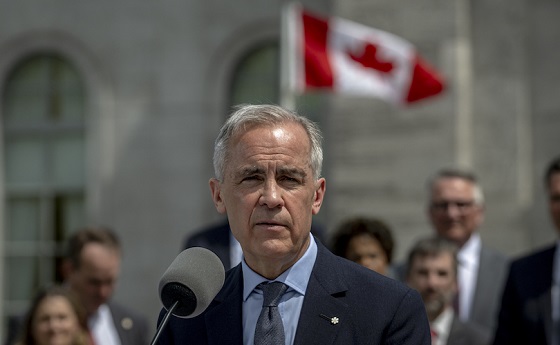Business
Energy leaders send this letter urging Prime Minister Mark Carney to unlock Canada’s resources

An Open Letter to the Prime Minister of Canada
The CEOs of Canada’s largest energy companies, including Canadian Natural Resources, Cenovus, Suncor, Imperial Oil and many more, have issued a new “Build Canada Now” letter to Prime Minister Carney. They are calling for Ottawa to repeal the production cap, scrap the tanker ban, simplify regulations and shorten project approvals so Alberta’s energy sector can create jobs, attract investment and help Canada become a true global energy superpower.
September 15, 2025
The Rt. Hon. Mark Carney, PC, MP
Prime Minister of Canada
Dear Prime Minister Carney,
Six months have passed since the first “Build Canada Now” letter was sent to you and the leaders of Canada’s other political parties outlining an action plan to unlock Canada’s world class oil and natural gas resources to strengthen Canada’s economic sovereignty, resilience and prosperity. After the election, we followed up with a second letter expressing our support for our shared vision of Canada becoming an energy superpower, one that harnesses both conventional and clean energy resources. Since then, we have seen progress but it is insufficient to stimulate the investment and growth required to make this vision a reality.
Thank you for leading the positive change in tone from the Federal Government in terms of the importance of economic development, including expanded investments in conventional energy. The launch of the new Major Projects Office, Indigenous Advisory Council, the initial list of projects of national significance, and the announcement that it will begin work in support of Pathways Plus are critical steps in the right direction. We appreciate the progress the Federal Government has made in these areas.
However, Canada still lacks the clear, competitive and durable fiscal and regulatory policies required to achieve the so-called “Grand Bargain”. That bargain being significant emissions reductions, expanded market access and material upstream production growth. Achieving these three inter-related outcomes goes beyond progressing select major projects but rather includes a multitude of other projects and related investments. Consequently, we reiterate our call to work together to make the policy changes required for this to happen.
Our call to action is urgent, with persistent indicators that the Canadian economy is moving in the wrong direction. The need to improve productivity and create jobs requires swift and decisive action. Canada is blessed with an enviable abundance of oil and natural gas resources and has the expertise to develop them in a manner consistent with environmental responsibility, social values, and working with Indigenous groups for the benefit of Canada and Canadians. As leaders of this sector, we have consistently advocated for the changes required to unwind the past decade of increasing policy complexity and uncertainty that led to delayed investments, lost opportunities and a competitive disadvantage on the global energy stage.
Given your background, you understand that the private sector and public markets require clarity and certainty to make the long-term investments necessary to realizing this sector’s potential, in turn creating thousands of high-paying jobs and significantly strengthening Canada’s economy.
Making the changes expressed in the earlier Build Canada Now letters are necessary to send clear signals that Canada is open for business. To reiterate, we believe that your government must focus on the following:
- Significantly simplify regulations. The Federal Impact Assessment Act and West Coast tanker ban are impeding development and need to be overhauled and repealed, respectively. Existing processes are complex, unpredictable, subjective, and excessively long. Processes need to be clarified and simplified, and decisions must withstand judicial review.
- Shorten timelines for project approvals. The Federal Government needs to dramatically reduce regulatory timelines to approve all projects within months, not years, of application. This is required to restore investor confidence and once again attract capital to Canada. Clarity on provincial versus federal jurisdiction related to project approvals is also required and needs to be respected.
- Commit to grow production, not limit it. The Federal Government’s unlegislated cap on emissions must be eliminated to allow the sector to grow and achieve its potential for the benefit of Canada and Canadians. The “production cap” creates uncertainty, is redundant, will result in production cuts, and stifles investment.
- Fiscal framework that attracts investment. The Federal carbon levy on large emitters is not globally cost competitive and should be repealed allowing provinces to set regulations. The Federal Government can lead cooperation across jurisdictions, protecting domestic and international competitiveness. Industry needs clear, competitive, and durable fiscal frameworks, including associated with carbon and overall taxation, to secure capital and incentivize investment.
- Incent Indigenous investment opportunities. The Federal Government needs to provide Indigenous loan guarantees at scale so industry can create ownership opportunities to increase prosperity and ensure Indigenous communities benefit from resource development.
As you have clearly stated, our country needs to move from “uncertainty to prosperity”. There needs to be tangible change to make this happen, and without clear and urgent action we risk missing a generational opportunity to capture the potential before Canada now.
As Parliament resumes for the Fall sitting, the energy industry remains committed to working with you, your cabinet, and the provinces on an urgent basis to achieve the energy sector’s potential for the good of Canada. Together, Canada can become the global energy superpower we all envision. We look forward to your response.
Sincerely,
Original signatories

Brandon Anderson
President & CEO
NorthRiver Midstream Inc

Doug Bartole
President & CEO
InPlay Oil Corp.

Robert Broen
President & CEO
Athabasca Oil Corporation

Scott Burrows
President and Chief Executive Officer
Pembina Pipeline Corp.

Chris Carlsen
President & COO
Birchcliff Energy Ltd.

Brad W. Corson
Chairman, President and Chief Executive Officer
Imperial Oil Ltd.

N. Murray Edwards
Executive Chairman
Canadian Natural Resources Limited

Darlene Gates
President and Chief Executive Officer
MEG Energy Corp.

Paul Hawksworth
President and Chief Executive Officer
Inter Pipeline Ltd.

Tyson Huska
President & CEO
Longshore Resources Ltd.

Mike Lawford
President & CEO
NuVista Energy Ltd.

Chris Mazerolle
President
Chevron Canada Resources

Nicholas McKenna
President
ConocoPhillips Canada

Paul Myers
President
Pacific Canbriam Energy Limited

François Poirier
President and Chief Executive Officer
TC Energy Corp.

Susan Riddell Rose
President & CEO
Rubellite Energy Corp.

Don Simmons
President & CEO
Hemisphere Energy Corporation

Adam Waterous
Executive Chairman, Board of Directors
Strathcona Resources Ltd.

Richard Wyman
President
Chance Oil and Gas Limited

Terry Anderson
President and Chief Executive Officer
ARC Resources Ltd.

Michael Binnion
President & CEO
Questerre Energy Corporation

Craig Bryksa
President and Chief Executive Officer
Veren Inc.

David J. Burton
President & CEO
Lycos Energy Inc.

Paul Colborne
President & CEO
Surge Energy Inc.

Greg Ebel
President and Chief Executive Officer
Enbridge Inc.

Grant Fagerheim
President and Chief Executive Officer
Whitecap Resources Inc.

Bryan Gould
Founder & CEO
Aspenleaf Energy Limited

Philip B. Hodge
President & CEO
Pine Cliff Energy Ltd.

Rich Kruger
President and Chief Executive Officer
Suncor Energy Inc.

Byron Lutes
President
Mancal Energy Inc.

Brendan McCracken
President & CEO
Ovintiv Canada ULC

Jon McKenzie
President and Chief Executive Officer
Cenovus Energy Inc.

Curtis Philippon
President & CEO
Gibson Energy

Mike Rose
President and Chief Executive Officer
Tourmaline Oil Corp.

Brian Schmidt
President & CEO
Tamarack Valley Energy Ltd.

David Spyker
President & CEO
Freehold Royalties Ltd.

Bevin Wirzba
President and Chief Executive Officer
South Bow Corp.

Vern Yu
President & Chief Executive Officer
AltaGas
Additional signatories



Automotive
Elon Musk Poised To Become World’s First Trillionaire After Shareholder Vote


From the Daily Caller News Foundation
At Tesla’s Austin headquarters, investors backed Musk’s 12-step plan that ties his potential trillion-dollar payout to a series of aggressive financial and operational milestones, including raising the company’s valuation from roughly $1.4 trillion to $8.5 trillion and selling one million humanoid robots within a decade. Musk hailed the outcome as a turning point for Tesla’s future.
“What we’re about to embark upon is not merely a new chapter of the future of Tesla but a whole new book,” Musk said, as The New York Times reported.
Dear Readers:
As a nonprofit, we are dependent on the generosity of our readers.
Please consider making a small donation of any amount here.
Thank you!
The decision cements investor confidence in Musk’s “moonshot” management style and reinforces the belief that Tesla’s success depends heavily on its founder and his leadership.
Tesla Annual meeting starting now
https://t.co/j1KHf3k6ch— Elon Musk (@elonmusk) November 6, 2025
“Those who claim the plan is ‘too large’ ignore the scale of ambition that has historically defined Tesla’s trajectory,” the Florida State Board of Administration said in a securities filing describing why it voted for Mr. Musk’s pay plan. “A company that went from near bankruptcy to global leadership in E.V.s and clean energy under similar frameworks has earned the right to use incentive models that reward moonshot performance.”
Investors like Ark Invest CEO Cathie Wood defended Tesla’s decision, saying the plan aligns shareholder rewards with company performance.
“I do not understand why investors are voting against Elon’s pay package when they and their clients would benefit enormously if he and his incredible team meet such high goals,” Wood wrote on X.
Norway’s sovereign wealth fund, Norges Bank Investment Management — one of Tesla’s largest shareholders — broke ranks, however, and voted against the pay plan, saying that the package was excessive.
“While we appreciate the significant value created under Mr. Musk’s visionary role, we are concerned about the total size of the award, dilution, and lack of mitigation of key person risk,” the firm said.
The vote comes months after Musk wrapped up his short-lived government role under President Donald Trump. In February, Musk and his Department of Government Efficiency (DOGE) team sparked a firestorm when they announced plans to eliminate the U.S. Agency for International Development, drawing backlash from Democrats and prompting protests targeting Musk and his companies, including Tesla.
Back in May, Musk announced that his “scheduled time” leading DOGE had ended.
Business
Carney’s Deficit Numbers Deserve Scrutiny After Trudeau’s Forecasting Failures

From the Frontier Centre for Public Policy
By Conrad Eder
Frontier Centre for Public Policy study reveals a decade of inflated Liberal forecasts—a track record that casts a long shadow over Carney’s first budget
The Frontier Centre for Public Policy has released a major new study revealing that the Trudeau government’s federal budget forecasts from 2016 to 2025 were consistently inaccurate and biased — a record that casts serious doubt on the projections in Prime Minister Mark Carney’s first budget.
Carney’s 2025–26 federal budget forecasts a $78.3-billion deficit — twice the size projected last year and four times what was forecast in Budget 2022. But if recent history is any guide, Canadians have good reason to question whether even this ballooning deficit reflects fiscal reality.
The 4,000-word study, Measuring Federal Budgetary Balance Forecasting Accuracy and Bias, by Frontier Centre policy analyst Conrad Eder, finds that forecast accuracy collapsed after the Trudeau government took office:
- Current-year forecasts were off by an average of $22.9 billion, or one per cent of GDP.
- Four-year forecasts missed the mark by an average of $94.4 billion, or four per cent of GDP.
- Long-term projections consistently overstated Canada’s fiscal health, showing a clear optimism bias.
Eder’s analysis shows that every three- and four-year forecast under Trudeau predicted a stronger financial position than what actually occurred, masking the true scale of deficits and debt accumulation. The study concludes that this reflects a systemic optimism bias, likely rooted in political incentives: short-term optics with no regard to long-term consequences.
“With Prime Minister Carney now setting Canada’s fiscal direction, it’s critical to assess his projections in light of this track record,” said Eder. “The pattern of bias and inaccuracy under previous Liberal governments gives reason to doubt the credibility of claims that deficits will shrink over time. Canadians deserve fiscal forecasts that are credible and transparent — not political messaging disguised as economic planning.”
The study warns that persistent optimism bias erodes fiscal accountability, weakens public trust and limits citizens’ ability to hold government to account — a threat to both economic sustainability and democratic transparency.
-

 Justice1 day ago
Justice1 day agoCarney government lets Supreme Court decision stand despite outrage over child porn ruling
-

 Daily Caller2 days ago
Daily Caller2 days agoUS Eating Canada’s Lunch While Liberals Stall – Trump Admin Announces Record-Shattering Energy Report
-

 Business1 day ago
Business1 day agoCarney’s budget spares tax status of Canadian churches, pro-life groups after backlash
-

 COVID-191 day ago
COVID-191 day agoFreedom Convoy leader Tamara Lich to appeal her recent conviction
-

 Business2 days ago
Business2 days agoPulling back the curtain on the Carney government’s first budget
-

 Energy2 days ago
Energy2 days agoEby should put up, shut up, or pay up
-

 Business2 days ago
Business2 days agoThe Liberal budget is a massive FAILURE: Former Liberal Cabinet Member Dan McTeague
-

 Daily Caller1 day ago
Daily Caller1 day agoUN Chief Rages Against Dying Of Climate Alarm Light











